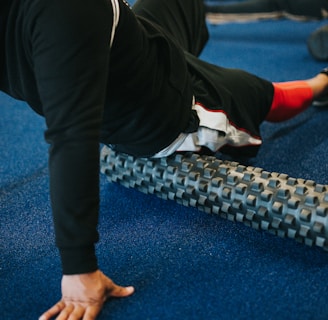The Science of Muscle Recovery: Unlocking Growth and Strength
Break down the role of recovery in muscle growth, and the importance of sleep, nutrition, and techniques like foam rolling, stretching, and active recovery.
LIFESTYLE
11/7/20242 min read


The Importance of Muscle Recovery
When it comes to building muscle and getting stronger, many folks focus intensely on their workout routines. However, what often gets overlooked is the crucial role recovery plays in muscle growth. Recovery is not just about taking a break; it's about allowing your muscles the time and means to repair and grow after strenuous activity. But how exactly does this process work? Let's dive into the science behind muscle recovery and discover why it's just as important as your workout.
Sleep and Nutrition: Essential Ingredients
One of the foundational aspects of effective muscle recovery is quality sleep. During sleep, your body works hard to repair tissues and synthesize proteins, which are essential for muscle growth. Aim for 7-9 hours of sleep each night to maximize recovery. But it's not just sleep that matters; nutrition plays a vital role, too. A diet rich in protein, healthy fats, and carbohydrates supports the recovery process, providing your body with the necessary fuel to rebuild muscle fibers. So next time you hit the gym, remember to eat a balanced meal afterward!
Active Recovery Techniques
Now that we’ve highlighted sleep and nutrition, let’s explore some practical methods for enhancing your recovery. Techniques such as foam rolling and stretching can significantly help alleviate muscle soreness and improve flexibility. Foam rolling works by breaking up tight muscle knots, while stretching allows for improved blood flow and range of motion. Active recovery, which includes low-intensity exercises like walking or cycling, can also be beneficial. It keeps blood circulating through your muscles, which helps flush out toxins and promotes the healing process.
To sum it all up, understanding the science behind muscle recovery is crucial for anyone serious about fitness. It’s not just about pushing your limits during workouts but also about how well you allow your body to recover afterward. Prioritizing sleep, fueling your body with the right nutrition, and incorporating techniques like foam rolling and stretching can make all the difference in your muscle growth journey. Remember, your muscles need time to recharge, so give them the care they deserve!
